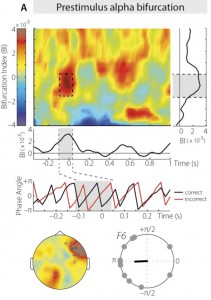Alumna Dr. Antje Strauß just got another paper on:
Alpha Phase Determines Successful Lexical Decision in Noise
by Antje Strauß, Molly Henry, Mathias Scharinger, and Jonas Obleser
appeared in Journal of Neuroscience. Check the abstract below;
Abstract
Psychophysical target detection has been shown to be modulated by slow oscillatory brain phase. However, thus far, only low-level sensory stimuli have been used as targets. The current human electroencephalography (EEG) study examined the influence of neural oscillatory phase on a lexical-decision task performed for stimuli embedded in noise. Neural phase angles were compared for correct versus incorrect lexical decisions using a phase bifurcation index (BI), which quantifies differences in mean phase angles and phase concentrations between correct and incorrect trials. Neural phase angles in the alpha frequency range (8–12 Hz) over right anterior sensors were approximately antiphase in a prestimulus time window, and thus successfully distinguished between correct and incorrect lexical decisions. Moreover, alpha-band oscillations were again approximately antiphase across participants for correct versus incorrect trials during a later peristimulus time window (∼500 ms) at left-central electrodes. Strikingly, lexical decision accuracy was not predicted by either event-related potentials (ERPs) or oscillatory power measures. We suggest that correct lexical decisions depend both on successful sensory processing, which is made possible by the alignment of stimulus onset with an optimal alpha phase, as well as integration and weighting of decisional information, which is coupled to alpha phase immediately following the critical manipulation that differentiated words from pseudowords. The current study constitutes a first step toward characterizing the role of dynamic oscillatory brain states for higher cognitive functions, such as spoken word recognition.


